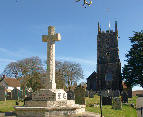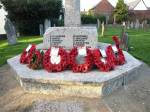There was no absolute necessity for Turkey to enter into the Great War and certainly it was debatable right up to the Allies declaration of war whether or not Germany would succeed in bringing Turkey in against the allies. Much of the blame can be laid at the diplomatic mismanagement exercised by the British and French in the preceding years, during which time Germany succeeded in infiltrating and directing Turkish policy.
For centuries before the Great War, Mesopotamia had been part of the Turkish Ottoman Empire. Lying along its eastern border was Persia, generally friendly to the British. The Arab Sheiks of nearby Kuwait and Muhammerah also supported Britain; the Arab tribes of coastal Mesopotamia often changed sides. Germany had for many years before the war assiduously developed Turkey as an ally, which it saw as an important part of the Drang nach Osten (“Thrust towards the East”). Germany wanted new lands, new markets - “lebensraum” and above all to threaten and strike at British interests in India.
Ever since the dismissal of Bismarck in 1890, the Kaiser had emphasized the danger of German encirclement, a war policy that appealed to business interests looking for big markets and to militarists who sought a war. The East offered glittering prizes - an Ottaman Empire in decay, which offered possibilities for railways, roads and bridges to be built, mines exploited, colonies seized. From about 1875 Germany plotted to increase its influence in Constantinople, persuading the Turks of the dangers of British commerce, power and prosperity. Distrust was fermented over Arabia, Mesopotamia, the Persian Gulf as well as discord over Egypt. Germany intrigued to bring the Sheikh of Kuwait into the Turkish Empire, Turkish claims to Qatar were supported, and the British commercial hold on Bahrain was challenged. British governments woke up to these dangers far too late, refusing to believe that our long-standing friendship with Turkey could be affected. Germany obtained a concession to build a railway from Berlin to Constantinople, completed in 1883, and in 1914 a railway from Baghdad to the Mediterranean across Anatolia was under construction, the so-called ‘Berlin to Baghdad Railway’, but had not yet been completed. The final concern was oil. In 1901 the British began prospecting for oil in Southern Persia and discovered a huge supply in Arbistan, and from there a pipe line was built to the island of Abadan in the Shatt-al-Arab at the head of the Persian Gulf. The Royal Navy had begun to move on to oil from coal for their new ships and Abadan was developed, becoming a purely British commercial enterprise.
The ‘Young Turks’ who had taken over the Government in 1912 were led by Enver Pasha, who was very pro-German. By 1914 the Turkish army was controlled by German ‘advisers’; from 1882 onwards by Lieutenant Van de Golz who became a Turkish Field-Marshall. He died in Baghdad in 1916 soon after the fall of Kut The Turkish army was completely reformed under a German Military Mission of 70 officers, headed by General Otto Liman von Saunders who arrived in 1913. Infiltration had also begun into the Turkish navy, up to then developed and served by a British naval mission. Meanwhile a Turkish army was massing in Palestine to threaten Egypt and re-take the country as a Turkish province, threatening the Suez Canal.
Germany was presented with a golden opportunity to finally urge Turkey into the war by the action of Winston Churchill, First Lord of the Admiralty. Britain was building two ‘Dreadnought’ battleships on the Tyne for the Turkish navy - already paid for and about to be launched in 1914, the money obtained by a Turkish public subscription promoted by patriotic speeches from Enver Pasha, minister of war. All that was required was the construction of a larger dock in Constantinople for their reception. With war looming, on 28th July Churchill proposed requisitioning the ships for the Royal Navy. Although totally illegal, the Cabinet authorised the theft on 31st July, but Turkey was informed only on 3rd August, with a dubious offer of a compensation repayment. Germany responded by the gift to Turkey of two German warships, the Goben and the Breslau that under British eyes slipped out of the Eastern Mediterranean, up the Narrows and anchored off Constantinople. Still Turkey hesitated. Then, on 27th October Germany ordered the Goeben and the Breslau, manned by German sailors dressed as Turks, to attack the Russian Black Sea ports of Odessa and Nicolayev, before proceeding to bombard Sebastopol, moves unauthorised by the Turkish government. Turkey was forced to declare war on Russia on 31st October, Russia declared war on 4th November, and Britain and France followed at once on 5th November.
On 2nd November, while still anchored off Bahrain and awaiting orders to enter and capture Basra, the Brigade Major of the 16th Brigade - which included the 2nd Battalion of the Dorsets - ‘India Expeditionary Force’ (Force ‘D’), issued the following order of the day on behalf of Brigadier-General W.S. Delamain, commanding Force ‘D’, to all troops under his command. The orders given to the Brig-General by the Viceroy of India were to protect the oil refineries, oil-tanks and the pipeline at Abadan and cover the landing of reinforcements if these should be required. Only if hostilities with Turkey were to become fact should he try to occupy Basra as well and to do this the rest of the 6th (Poona) Division of the Indian Army would give further assistance. News came through on November 5th that Turkey had attacked Russia on the Black Sea coast, and war was declared on this day.
Note that the ‘State of War’ that was supposed to exist in the Order was not actually declared until 3 days later. This shows a very clear intention of the British to prepare for hostilities, and all that was wanting was the final decision on when to do so.
Headquarters Indian Expeditionary Force 2.11.14
‘A state of war now exists between England and Turkey. Although since the beginning of the war with Germany England has made strenuous att6mpts to maintain peace and to preserve the ancient friendship with Turkey, nevertheless the latter power, urged on by German intrigue, has committed numerous acts of aggression, which have forced this war on England.
Our force is now proceeding to the head of the Persian Gulf prepared to protect British interests and friendly Arab Sheiks against Turkish attacks.’
Three days later, on November 5th, Brigadier-General Delamain received his orders to protect the oil refineries, tanks and pipeline at Abadan and cover the landing of reinforcements if these should be required. Only if hostilities with Turkey were to become fact should he try to occupy Basra too, and to do this the rest of the 6th (Poona) Division of the Indian Army would arrive as reinforcements. News came through that Turkey had attacked Russia on the Black Sea coast, and war was declared on this day.
As a result, on 6 November 600 British troops including some Royal Marines were landed near the old fort at Fao, which they captured. The rest of the Force ‘D’ sailed on to a place where they could safely disembark, at Sanniyeh. Considerable difficulty was encountered as there were no barges, tugs or small boats suitable, and land transport was poor. These were factors that remained throughout the Mesopotamia campaign. The British camp was attacked on 11th November, and was repulsed with heavy loss. On 2nd November a reconnaissance in force inflicted further losses on the Turks near Saihan. Conditions were poor, with thick dust, mud and heat mirage. The remainder of the Poona Division now landed.
Early in the day the 16th and 18th Brigades attacked the Turk fortress at Zain in a heavy rainstorm which slowed the advance to a walk. After an accurate bombardment the fort fell, leaving over 1000 Turkish casualties; the rest of the enemy streamed away, saved only by a mirage appearing which obscured the fleeing target of the British artillery. Cavalry were unable to pursue due to the heavy mud. British casualties in the advance of 2000 yards of open ground were 353. The Turks tried hurriedly to block the river by towing a string of ships across and sinking them. However, a cable broke and left a gap wide enough for one vessel at a time to pass.
Meanwhile, on 20 November General Sir Arthur Barrett, commanding the 6th (Poona) Division, received news from a local Arab Sheikh that the Turks had withdrawn and abandoned Basra. Two battalions (104th Wellesley’s Rifles and 117th Mahrattas) embarked immediately and sailed to Basra. After their retreat from Basra, the Turks took up a position where they could make a stand against a further British advance. The best position was at Qurna, which was soon secured with the loss of only 65 men killed (5 British) against Turkish losses of about 300 killed and a thousand taken prisoner. There seemed little need for any further advance, since already the British had now secured their oil supplies in the Middle East; this had immense strategic implications, as this oil field supplied most of the Royal Navy’s fuel. To the Turks, the loss of Basra caused more loss of face than strategic damage.
Unfortunately the relative ease with which the Turks were defeated at Qurna led the British and Indian leadership to believe that further advances would be equally cheap. Thus, without prior thought of the complexities involved in any attempt to advance further up river, using only very inadequate river transport for transport or supply, the idea was established that the object of Force ‘D’ was the capture of Baghdad. Victory over the Turks was believed by some - notably David Lloyd George and Winston Churchill - to be a less costly way towards the defeat of Germany than the painful battering at the Western Front. Pushed by Germany - which also tried to encourage a Jihad (Muslim Holy War) against the British forces - Turkey was to strongly resist the British incursion into their territory, both in Gallipoli and Mesopotamia as well as later on in Palestine.


